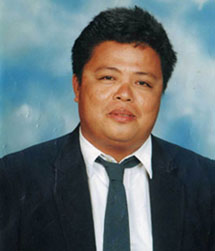A Supreme Court decision to allow a change of venue in the trial of three suspects accused of murdering journalist Dennis Cuesta, at left, in August 2008 sets a hopeful precedent in the fight against impunity in media killings in the Philippines. The decision was granted in mid-July and press freedom groups tracking the case learned about the ruling on August 28.
The change of venue petition from General Santos City, where the murder occurred, to Makati City within the national capital, was first filed by the Freedom Fund for Filipino Journalists in February due to concerns that local courts wouldn’t give the case a fair hearing. The main suspect in the case, Police Chief Inspector Redempto “Boy” Acharon, is a first cousin to the city’s mayor and currently evading an arrest warrant issued against him in April.
CPJ research shows that provincial-level courts are often prone to political influence in media killing cases that allegedly involve government officials, including wayward police officers who are all too frequently implicated in such murders. Cuesta’s widow, Gloria, expressed her doubts to CPJ in early July that she could receive a fair trial in her husband’s murder because of the powerful local interests she was up against.
Acharon’s defense attorney, Rogelio Garcia, has resorted to various legal tactics to attenuate the early legal proceedings, including a successful petition in February to have the case reassigned from one General Santos City branch court to another. The request, which was granted by a local judge, effectively withdrew a previous court-ordered arrest warrant for Acharon and took preliminary proceedings back to square one.
Garcia told CPJ by telephone in early August that he planned to appeal to a higher court the new arrest warrant issued in April because the branch court that received the case hadn’t independently established Acharon had “probable cause” to murder Cuesta but rather relied on the previous court’s legal assessment. Such local-level stalling tactics are commonplace in the distressingly high number of unsolved journalist murder cases in the Philippines.
Journalists, public prosecutors and press freedom advocates who spoke with CPJ during a fact-finding mission in July all lamented that Manila and its outlying suburbs are the only places a fair trial can be held for their many fallen colleagues. And while many will have breathed a sigh of relief for the change of venue ruling in the Cuesta case, there are several similar petitions related to media killings still pending with the Supreme Court that require prompt attention.
